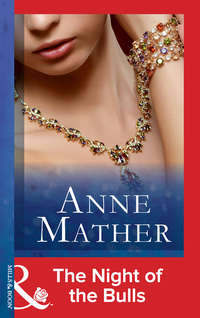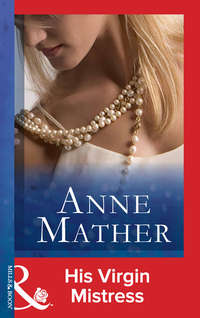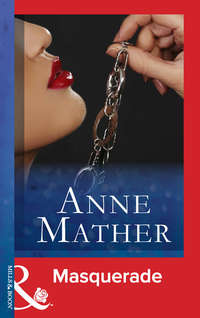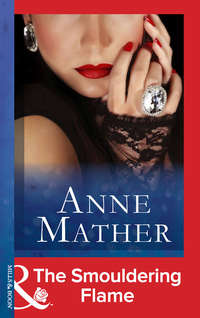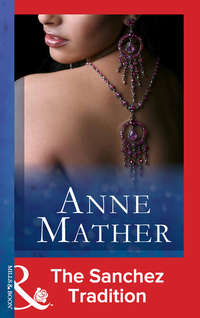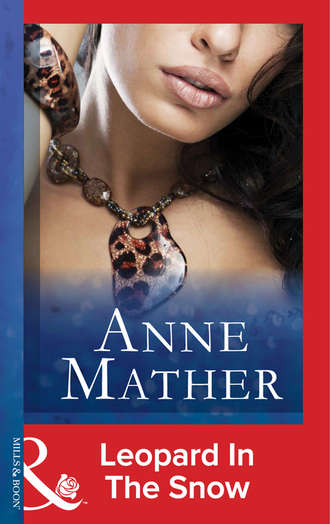
Полная версия
Leopard In The Snow
“Of course, sir.” Bolt’s mouth moved in the semblance of a smile. “I gather the young lady will be staying the night. I’ll prepare a room for her, shall I?”
“Thank you, Bolt.” The other man threw off his leather coat to reveal a black silk shirt and waistcoat beneath. The manservant took his coat, and then his employer turned to Helen. “You may give your coat to Bolt, too. I assure you he knows how to handle wet garments without causing them any ill effects.”
Helen was shivering so much she couldn’t undo the leather buttons, and to her astonishment the man limped forward and brushing her cold hands aside unfastened the coat himself. Then he lifted his hands and slid it off her shoulders and the man Bolt caught it as it fell.
Helen shivered all the more. She resented the way he had taken control without her permission. She didn’t know this man with his harsh face and mocking tongue, and nor did she want to. Something about him disturbed her, frightened her even. She told herself it was his limp, the way his hip twisted when he moved, the arrogance of the man. And yet the fleeting touch when his fingers had deposed hers had caused a shaft of fire to shoot up her arm almost as though his touch had burned her, and she was at once fascinated and repelled.
Bolt moved to open a door to their right. Realising that both men were waiting for her to make the first move, she walked jerkily into the room beyond, hugging herself tightly in an effort to stop the enervating shivering. She found herself in an enormous living room lit by two standard lamps and by the glow from a roaring fire in the huge grate. Logs had been piled on to the blaze and the room was redolent with the scent of pine. The floor was partially covered with rugs and as well as several dining chairs and a bureau there was a dark brown, tapestry-covered three-piece suite which, although it had seen better days, looked superbly comfortable. Some shelves to one side of the fireplace were well filled with books and paperbacks and magazines, and a tray on which reposed a bottle of Scotch, a decanter of what looked like brandy, and two glasses were set conveniently beside the armchair at the farther side of the fire.
The door closed as Helen was pondering those two glasses, and she flinched as the cheetah brushed past her to stretch its length on the hearth. She glanced round apprehensively, half afraid she was alone with the beast, to find the man limping towards her. The servant Bolt had apparently gone about his business.
“Won’t you sit down?” he asked, indicating the couch in front of the fire, and after a moment Helen moved to perch uneasily on the edge of an armchair.
The man gave her a wry look, and then took the armchair opposite, stretching his long legs out in front of him with evident relief. After a moment, he turned sideways and took the stopper out of the decanter. “Some brandy, I think,” he remarked quietly, with an encompassing glance in her direction. “You seem in need of – sustenance.”
He did not get up to give her the drink but stretched across the hearth and Helen had, perforce, to take it. Brandy was not her favourite spirit, but she was glad of its warmth to take away the chill inside her. She sipped it slowly, and gradually she stopped shaking.
Her companion did not have anything to drink, but lay back in his armchair, his eyes half closed, surveying her with penetrating intensity. Before she had finished the brandy, Bolt returned with a tray of tea. He ousted the cheetah from its comfortable position on the hearth and set an occasional table in its place, putting the tray within easy reach of his master. Then he straightened, and said: “I’ll go for the suitcases now, sir. If the young lady will give me her keys.”
“Oh! Oh, yes, of course.” Helen gave him a rueful smile and rummaged in her handbag. She produced the leather ring which held all her keys and handed it over. “I’m very – grateful, Bolt. It’s about a mile down the road – the car, I mean.”
Bolt nodded. “I’ll find it, miss.”
“Thank you.” Helen wriggled a little further on to her chair. The brandy had done its work and she was beginning to feel almost normal again. This time tomorrow she might have reached Bowness and this whole episode would be simply a memory, something amusing to tell her friends when she got back to London.
After the door had closed behind Bolt, the man opposite sat up and regarded the tray. As well as the teapot and its accoutrements there was a plate of sandwiches and a rather delicious looking fruit pie.
“Milk and sugar, or lemon?” he enquired, the tawny eyes annoyingly disconcerting. But with her newly restored self-confidence, Helen refused to be intimidated.
“Milk, but no sugar, thank you,” she replied, and as he poured the tea she went on: “Don’t you think it’s time we exchanged names?”
The man finished pouring the tea, added milk, and handed the cup to her. “If it’s important to you,” he conceded dryly.
Helen gasped. “You mean you would ask a complete stranger to share your house without caring what that person’s name was?”
“Perhaps I consider the kind of person one is rather more important than one’s name,” he suggested, continuing to look at her, his eyes unblinking. “For example, I don’t need to know your name to know that you’re a rather headstrong young woman who doesn’t always take the advice that’s offered to her.”
Helen flushed. “How can you know that?” she exclaimed scornfully.
He shrugged. “It’s unusual, is it not, to find a young woman like yourself driving alone in conditions like these and apparently, as you’ve admitted you have suitcases with you, prepared to stay somewhere.” He frowned. “You may have arranged to meet someone, of course, and yet you seem unconcerned at being delayed overnight.”
Helen sipped her tea. “Women have been known to make journeys alone, you know,” she retorted.
“In conditions like these? It’s not usual.”
“I – I may be a working girl – a representative of some sort.”
“Who’s lost her way?”
“Yes.”
“Possible. But not probable.”
“Why not?”
“I don’t think you are a working girl.”
Helen uttered an impatient exclamation. “Why not?”
“The way you spoke to Bolt. As though you were used to having people run about after you.”
Helen sighed. She had the feeling that in any argument with him she would come out the loser. And he was offering her his hospitality, after all. Perhaps she could be a little more gracious in accepting it. It wasn’t like her to behave so cattily. But something about him brought out the worst in her.
“All right,” she conceded at last. “So I’m not a working girl. As a matter of fact, you’re right. My name is Helen James. I’m Philip James’ daughter.”
“Should that name mean something to me?” he enquired, somewhat sardonically. She noticed he did not take tea but helped himself to a sandwich after she had refused. “I’m afraid I’m rather – out of touch.”
He smiled and for a moment he looked years younger. Helen’s lips parted. His face! Something about his face was familiar. She had seen it before – she was sure of it. But where? And when? And in what connection?
Forcing herself to answer his question even while her brain turned over the enigma endlessly, she said: “My father is Sir Philip James. His company won an award for industry last year. Thorpe Engineering.”
The man shook his head. “I’ll take your word for it.”
Helen felt impatient. “And you? You haven’t told me your name?”
“Tell me first what you’re doing here – miles from the kind of civilization I’m sure you’re used to.”
Helen bit her lip. “As a matter of fact I – needed to get away on my own for a while. I needed time to think and my father will never dream of looking for me here.”
The man frowned. “You mean – you’ve run away?”
“Hardly that. I left my father a note. He doesn’t have to worry about me.”
“But he will.”
“Perhaps.” Helen moved uncomfortably. “In any event, none of this need concern you. I’m only grateful that you came along as you did. I could have been in real difficulties if you hadn’t.”
“You could. You could have died out there – in the snow.” His voice was low-pitched and for a moment Helen felt a tingle of remembered apprehension. “It was very foolish of you to let no one know where you were going. Don’t you realise that your car could have been buried for days before anyone found it – or you? Tell me, why was it so important that you should get away?”
Helen felt indignant. “I don’t think that’s any business of yours.”
“Nonetheless, I am curious. Satisfy the curiosity of one who no longer inhabits the world you come from.”
Helen stared at him. What a strange thing to say! Surely even the remoteness of this district in winter did not cut one off completely from the outside world. Unless one chose it to be so … She shook her head.
“My father wants to run my life for me,” she said slowly. “But I’m twenty-two – and possibly too independent, as you implied. We – disagreed over a small matter.”
“I don’t think it can have been such a small matter to bring you more than two hundred miles in the depths of winter, Miss James, but never mind. I respect your desire to keep your personal affairs private.”
Helen’s mouth turned down at the corners. It was hardly a concession. Leaning forward to replace her empty cup on the tray, she said: “And you? Don’t you find it lonely living here, miles from anywhere, with only Bolt for company?”
The man’s thick lashes veiled his eyes. “I’m a most uninteresting individual, Miss James. Can I offer you more tea?”
Helen declined, pressing her lips together impatiently. “Why are you avoiding answering me?” she demanded.
“Was I doing that?” His tone was mild, but his tawny eyes were watchful.
“You know you were.” Helen sighed, a frown drawing her dark brows together. “I know your face from somewhere. I’m almost sure I’ve seen you before – either in the flesh or on film!”
“You’re very flattering,” he mocked. “Isn’t that usually the male’s prerogative?”
Helen was annoyed to find that he could embarrass her. It was a new experience for her. “You know what I mean. I have seen your face before, haven’t I?”
The man seemed bored by her assumption. He rose abruptly to his feet, pausing a moment to rub his thigh as though it pained him. Then he walked with his uneven gait across to the long windows and drew heavy wine-coloured velvet curtains over the frosted panes. Helen saw, in those moments before the world outside was hidden from view, that it was already dark and the driving flakes of snow filled her with a disturbing sense of remoteness. She should have asked for help in starting her car again instead of accepting the man’s hospitality, whoever he was, she thought uneasily. With his directions, surely she could have driven to some small hotel or guest house. But she soon dismissed these thoughts from her mind. She was being ridiculously fanciful in imagining that there was anything sinister in the assistance being offered to her, and besides, she ought to be grateful – he had virtually saved her life!
He turned back to her. “Bolt shouldn’t be long with your cases, then he’ll show you where you’re to sleep, Miss James. I have an evening meal at about eight o’clock. I trust you’ll join me.”
Helen shifted in her seat, a feeling of irritation replacing apprehension. He was clearly determined not to answer her questions. Her sudden movements caused the cheetah to raise its head and stare at her. The eyes turned in her direction were curiously like its master’s, and tales of witches and warlocks and their familiars flashed through her brain. Who was this man who lived in such splendid isolation – who walked with a limp – who kept a wild beast for company? She had an absurd notion that she must have succumbed to the cold and collapsed out there in the snow and this was some fantastic nightmare preluding death …
She started violently at the horrific twist of her thoughts and the cheetah allowed a low growl to escape from its powerful throat. The man came towards them then, murmuring reassuringly to the animal, his eyes on Helen’s troubled countenance.
“Is something wrong, Miss James?” he enquired, his voice as soft as velvet with an underlying thread of steel.
Helen shook her head, looking almost desperately about the lamplit room. It was a most attractive room, she had to admit, and not at all the sort of surroundings to inspire unease. It had a masculine austerity, an absence of anything frivolous, but that was only to be expected. There were hunting trophies on the panelled walls, swords in their scabbards and antique guns, and several pieces of ornamental design which Helen recognised as being valuable. The room gave an impression of quiet quality and distinction, and although some of the appointments bore the marks of well-use, they did not detract from its air of comfortable elegance. Whoever he was, he was not a poor man, but why he should choose to live as he did was beyond her comprehension. Was he a painter, a sculptor, an artist of some sort? Who else desired such a solitary existence?
And then a framed photograph on the wall behind the bureau caught her eye. She couldn’t distinguish every detail from where she was sitting, particularly in this shadowy light, but what she could see was enough to realise that it was the blown-up picture of a car smash, a violent pile-up of men and machinery that churned up the road and threw fragments of metal into the dust-choked air. It was not a coloured photograph, but its perception was such that the ugliness and savagery of the crash were brutally unmistakable.
Her shocked gaze shifted to the man who was now standing so stiffly beside the couch. The tawny eyes were hard and narrowed and she knew he had intercepted her revealing concentration on the photograph. She also knew why he was suddenly so aloof. He had guessed that her earlier suspicions regarding his identity were suspicions no longer. He had been one of the drivers involved in that ghastly crash. But it had been no ordinary pile-up. It had taken place about six years ago, on the Nurburgring in Germany …
“I know who you are,” she said, slowly, wonderingly. She got to her feet. “You’re – Dominic Lyall, the racing driver!”
The stiffness went out of his lean body and he leant against the back of the couch, supporting himself with his palms on the braided tapestry cushions. “I am Dominic Lyall, yes,” he conceded wryly. “But I’m no longer a racing driver.”
“But you were.” Helen stared at him. “I remember my father talking about you. He admired you tremendously before – before –”
“Before the crash?” His tone was bitter. “I know.”
“But he thought – I mean –” She broke off, her brows drawn together in perplexity. “It was generally assumed – well, you disappeared. My father said – lots of people said –” She moved her shoulders uncomfortably, leaving the words unsaid.
“It was thought that I was dead?” He was ironic. “Oh, yes, I’m quite aware of that rumour. My injuries were extensive, and it suited me to foster such a belief. There’s nothing more pathetic than a fallen idol who still tries to hog the limelight.”
“But it wasn’t like that,” Helen protested. “The crash was a terrible accident. No one was to blame. The publicity –”
“Did I say I blamed myself?” he interrupted her, his voice cool and cynical.
“No. No, but –” She caught her lower lip between her teeth. “My father was such a fan of yours. He still has some pictures of you in his study. And there were thousands of others like him. Do you think it was fair to allow them to assume that you were dead?”
Dominic Lyall straightened, one long brown hand massaging his hip. “Do you think I’m not entitled to any privacy simply because for a time I lived in the public eye, Miss James?”
Helen didn’t know how to answer him. “I wouldn’t presume to make judgements, Mr. Lyall. All I’m saying is that it seems a pity that a talent such as yours should be denied to other aspiring drivers.”
His lips twisted. “So much and no more.” He ran his fingers over the light hair at the nape of his neck. “You wouldn’t begin to understand, Miss James.”
Helen held up her head. “You underestimate me, Mr. Lyall.”
His smile held a kind of self-mockery. “Perhaps I do, at that. However …” He drew a deep breath. “However, it’s unfortunate that your memory serves you so well. I should have thought a child of sixteen would have been more interested in popular music and its idols.”
“I’ve told you – my father went to racing events. Sometimes I went with him.”
“Oh, yes, your father.” His eyes narrowed broodingly. “A curious anomaly.”
“What do you mean?” His words troubled her a little.
Dominic Lyall moved his powerful shoulders in a deprecative gesture. “I should have thought it would have been obvious, Miss James.”
“What would have been obvious?”
He regarded her with that denegrating unblinking stare. “Why, your recognising me, Miss James. A most – unfortunate occurrence. I’m afraid it means that you will not be leaving here in the morning, after all.”
CHAPTER TWO
FOR several minutes there was complete silence in the room. Helen couldn’t believe she had heard him aright, but something in that lean, harsh countenance warned her that she had.
“You – you can’t be serious!” she said at last.
“I’m afraid I am, Miss James.”
“But – but why? Why?”
“Surely that’s obvious, too. I have no intention of laying myself open to the kind of publicity that the discovery of me living here would create.”
Helen refused to admit to the sense of panic that was churning inside her. “But – but I wouldn’t tell anyone,” she protested, saying the words she had heard so many times on the films and in television when the central character was confronted by some fugitive from the law. But Dominic Lyall was not a fugitive from the law – only from the world!
“I’m afraid I couldn’t take that risk.” He shook his head. “I think the temptation to tell your father that the man he thought dead was alive and well and living in the Lake District would be more than you could stand.”
“It – it wouldn’t!” Helen twisted her hands together. “In – in any case, you can’t keep me here! I – it’s illegal!”
His smile was not pleasant. “Really?”
“But – but it’s insane! I mean, my father will be looking for me!”
“You told me yourself he would never dream of looking for you here.”
“Not initially, no. But if all else fails –”
“By then you will no doubt be free to go back to him.”
She trembled. “What do you mean?”
“Simply that I intend to make arrangements to leave the country. Until I do, you will remain.”
Helen gasped. “But that could take months!”
“Weeks, anyway,” he conceded dryly.
The door opened suddenly behind her and she started nervously. It was the manservant, Bolt, who stood on the threshold, his massive shoulders coated with snow.
“Ah, Bolt, you’re back.” Dominic Lyall greeted the man with a warmth he had not shown to Helen. “Did you find the car?”
Bolt grinned. “Yes, sir. The suitcases are in the hall. If you’ll give me a moment to shed my coat, I’ll show the young lady to her room.”
Dominic Lyall nodded. “Do that, Bolt. And by the way, our house guest’s name is Miss James, Miss Helen James. She’ll be staying with us rather longer than we expected.”
Helen had no idea what message flashed between the two men, but Bolt’s only show of surprise was a faint drawing together of his brows. He tossed Helen’s keys and said: “Yes, sir.”
“I’ll take those,” went on his employer, catching the keys as Bolt tossed them to him. “I’ll explain the situation later, right?”
“Yes, sir.”
Bolt was infuriatingly complacent, and Helen, standing watching the two men, felt absurdly near to tears. This couldn’t be happening to her. It really couldn’t. Dominic Lyall wasn’t seriously intending to keep her here until he made arrangements to leave the country, was he?
“I don’t want to see my room!” she burst out tremulously. “You can’t keep me a prisoner here, you can’t!”
Dominic Lyall’s mouth had a slightly cruel twist. “And how do you propose to prevent me?” he enquired, in a soft, menacing tone.
“I – I’ll run away –”
“Again?”
“I’ll go to the nearest farm – or village. I – I’ll phone for help!”
“There are no phones here, Miss James.”
“I mean – in the village.”
“Do you know the way to the village?” Dominic Lyall asked quietly.
“It shouldn’t be too difficult to find.” Helen’s voice broke.
“In these conditions?”
A sob rose in her throat. “You’re mad! Mad!” She caught her breath. “I don’t want to stay here. I just want to go to Bowness. I promise I won’t tell a soul I’ve seen you. Just let me go!”
“I’m afraid that’s impossible, Miss James.” Her tormentor turned to Bolt. “We must move the car tomorrow. Before the thaw sets in.”
Bolt nodded. “I’ll see to it in the morning.”
Helen felt a devastating sense of hopelessness. There seemed no way out of this bizarre situation. Out of her own mouth she had condemned herself. If she had not told him of her flight from her father – if she had not recognised him – if, if, if …
“You can’t stop me from trying to escape,” she declared tremulously.
“I shouldn’t advise it,” Dominic Lyall commented, flexing his back muscles.
There was a definite look of weariness about him now and Helen realised with a pang that it was standing so long that tired him. She ought to have felt glad that he was not as invulnerable as he would like her to believe, but she didn’t. A traitorous sense of compassion was stirring within her, and she wondered what it was that had made him spurn the world he knew for this almost ascetic isolation.
Bolt, too, was aware of his master’s discomfort, and with the familiarity of years of service said with anxious reproof: “It’s almost time for your treatment, sir. If you’ll go down, I’ll be with you as soon as I’ve shown Miss James to her room.”
Dominic Lyall’s expression showed vague self-derision as he looked across at Helen. “You see how it is with me?” he demanded bitterly. “I’m like an old piece of machinery that needs constant oiling, aren’t I, Bolt?”
Helen’s lips parted. “You’re not old!” she exclaimed, unable to prevent herself.
“At least as many years older than you were when first you heard my name,” he stated grimly, as a spasm of pain crossed his lean face. “If – you will – excuse me …”
He left the room limping heavily, his hip twisting in a grotesque distortion of itself. Bolt watched him go, an expression of such love and devotion on his face that Helen felt almost an interloper. The cheetah, too, moved silently after its master and then Bolt turned back to her.
“One moment, miss,” he said, unbuttoning his fur-lined overcoat and taking it off. “If you’ll come with me.”
Helen wanted to protest. She ought to protest. She should say all over again that this was crazy, that they couldn’t keep her here against her will, that she would find some way to get away whatever they told her. But she didn’t. Instead, she watched Bolt pick up her suitcases and then followed his enormous frame up the wide oak staircase, her feet sinking into the pile of its leaf-brown and gold carpet.
Like the hall, the staircase was panelled, and halfway up there was a circular window overlooking the back of the house. It was difficult to see anything through the swirling flakes that were still falling, but the brilliance of the snow did give an artificial illumination to the scene.
At the top of the stairs, a long landing led in either direction. A balustrade overlooked the well of the hall below, and Helen silently admired a crystal chandelier suspended there. Bolt led the way along the landing to the right of the stairs passing several doors before halting at the room which was to be hers. He opened the door, switched on the lights and allowed Helen to precede him inside.


